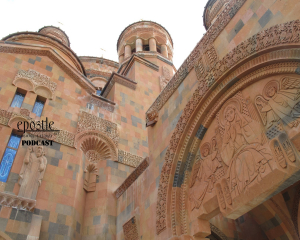Twinkies and Devil Food Cakes – Day 39 of Lent
Armodoxy for Today: The Devil and Twinkies – Day 39 of 40
Remember getting in trouble as a kid? No matter who it was who caught you, whether it was your parents, uncle, aunt or teacher, it was easy to pass the buck when you’re young enough to plead ignorance. I didn’t know it was wrong… My friend made me do it… My brother put me up to it…. Everyone else is doing it… are all excuses that parents have heard ad nauseum. And then there was the big scapegoat: the Devil. “The Devil made me do it!”
Scapegoating is as old as the hills. In the Genesis creations story, when God asks the man about his disobedience, the man blames the woman who then blames the serpent. But there’s no need to go back that far in time to hear a good one, take the 1979 trial of Dan White who assassinated San Francisco Mayor George Moscone and Supervisor Harvey Milk. At his trial, defense argued that White suffered diminished capacity because of his depression, attributed to a change in his diet from healthy food to Twinkies. The exact details of the defense can be studied on line, but improbable legal defenses now carry the label, “Twinkie Defense.”
Yesterday we heard St. Paul’s words, “…When I became a man, I put away childish things.” (I Corinthians 13) The Lenten experience brings us to a maturity of faith. Taking our relationship with God seriously means accepting responsibility for our actions. We have arrived knowing that we can try our best and if we fall short, God’s love gives us an opportunity for forgiveness. As we learned, we are forgiven our trespasses as we forgive those who trespass against us, hence, the responsibility is placed squarely on our shoulders. We must forgive, to be forgiven.
Armodoxy points to the path of personal responsibility. By understanding our responsibility for our actions, our actions become more fine-tuned to promote peace and harmony. The words of Christ are now spoken to us directly and our line of communications with God are open. We understand that empathy and compassion are key to living the Christian life. By living the Lenten exercises of a charity, fasting and prayer, new opportunities are open to us. The end of Lent signals a continuation and a beginning.
Your act of charity today is to pray for those around you. Fast from anything that distracts you from the clarity you are coming into. Enjoy tropical sweet potatoes, the featured recipe in the link below.
We pray what is known as the Serenity Prayer authored by Reinhold Niebuhr,
God grant me the serenity
to accept the things I cannot change;
courage to change the things I can;
and wisdom to know the difference.
Living one day at a time;
Enjoying one moment at a time;
Accepting hardships as the pathway to peace;
Taking, as He did, this sinful world
as it is, not as I would have it;
Trusting that He will make all things right
if I surrender to His Will;
That I may be reasonably happy in this life
and supremely happy with Him
Forever in the next.
Amen.
Lenten Recipes by Deacon Varoujan: Recipe 39: Tropical Sweet Potatoes



